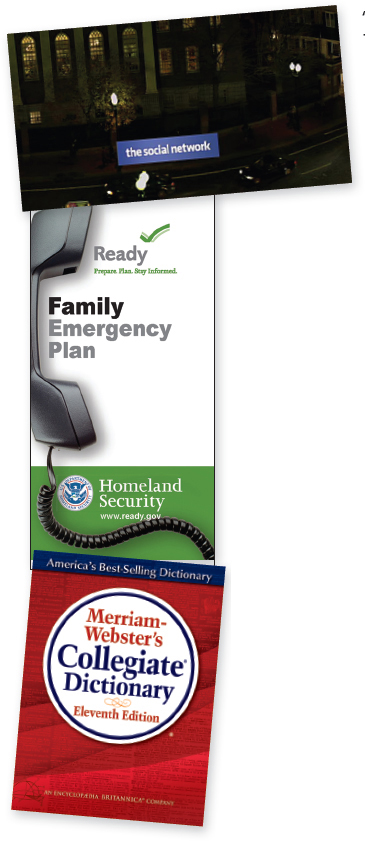Titles
Chapter Opener
31
name your work
Titles
Titles may not strike you as an important aspect of writing, but they can be. Sometimes the struggle to find a good title helps a writer shape a piece or define its main point. Of course, a proper title tells readers what a paper is about and makes searching for the document easier.
Use titles to focus documents. A title that is too broad early on in a project is a sure sign that you have yet to find a manageable topic. If all you have is “Sea Battles in World War II” or “Children in America,” you need to do more reading and research. If no title comes to mind at all, it means you don’t have a subject. (develop a statement) You’re still exploring ideas.

Titles tell readers what to expect.
Top: Columbia Pictures/Photofest. Center: Federal Emergency Management Agency/Ready Campaign. Bottom: By permission. From Merriam-
For academic papers, titles need be descriptive. Consider these items culled at random from one issue of the Stanford Undergraduate Research Journal. As you might guess, scientific papers aimed at knowledgeable specialists have highly technical titles. Titles in the social sciences and humanities are less intimidating but just as focused on providing information about their subjects.
“Molecular and Morphological Characterization of Two Species of Sea Cucumber, Parastichopus parvimensis and Parastichopus californicus, in Monterey, CA”
— Christine O’Connell, Alison J. Haupt, Stephen R. Palumbi
“Justifiers of the British Opium Trade: Arguments by Parliament, Traders, and the Times Leading Up to the Opium War”
— Christine Su
“The Incongruence of the Schopenhauerian Ending in Wagner’s Götterdämmerung”
— James Locus
Create searchable titles. For academic or professional papers, a thoughtful title makes sense standing on its own and out of context. It should also include keywords by which it might be searched for in a database or online. For example, an essay titled “Smile!” wouldn’t offer many clues about its content or purpose; far more useful is the title of a real journal article by Christina Kotchemidova, “From Good Cheer to ‘Drive-
If you must be clever or allusive, follow the cute title with a colon and an explanatory subtitle.
“‘Out, Damn’d Spot!’: Images of Conscience and Remorse in Shakespeare’s Macbeth”
“Out, Damn’d Spot: Housebreaking Your Puppy”
Avoid whimsical or suggestive titles. A bad title will haunt you like a silly screen name. At this point, you may not worry about publication, but documents take on a life of their own when uploaded to the Web or listed on a résumé. Any document posted where the public can search for it online needs a levelheaded title, especially when you enter the job market.
Capitalize and punctuate titles carefully. The guidelines for capitalizing titles vary between disciplines. See Chapters 46 and 47 for the MLA and APA guidelines, or consult the style manual for your discipline.
Your titles should avoid all caps, boldface, underscoring, and, with some exceptions, italics (titles within titles and foreign terms may be italicized; see examples above). For Web sites, newsletters, PowerPoint presentations, and so on, you can be bolder graphically. (think visually)